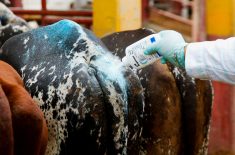Drugmaker Pfizer’s restructuring of its estrogen extraction plant at Brandon, Man. calls for about 40 per cent fewer employees by the end of next year.
The company processes conjugated estrogen from pregnant mares’ urine (PMU) at Brandon to make the hormone replacement therapy Premarin, used to treat menopausal symptoms in women.
Pfizer said Tuesday it plans to cut about 50 of 130 positions at the plant "gradually through to the end of 2013."
The company said it "operates in a very competitive and challenging environment which requires a continual review of its operations to look for efficiencies and cost reductions by using our resources and technology more effectively."
Read Also

Mexico agriculture secretary says still no date for restarting cattle exports to U.S.
Mexican Agriculture Minister Julio Berdegue said on Wednesday that Mexico and the United States have not yet set a date to resume Mexican cattle exports amid an outbreak of the flesh-eating screwworm parasite.
Changes at the Brandon plant "will enhance the site’s competitiveness and best position it for the future," the company said.
However, this decision "will not impact the site’s rancher network who support the plant’s production," Pfizer said. The company sources raw PMU from a network of 26 equine ranchers across Manitoba and Saskatchewan.
The Brandon facility was set up in the mid-1960s and became a Pfizer plant when the company bought fellow drugmarker Wyeth in 2009.
Wyeth substantially downsized its PMU ranch network in the first half of the last decade, as hormone therapy study data came forward from the U.S. government-backed Women’s Health Initiative and Premarin use and dosages were reduced.
The plant still distributes conjugated estrogens to markets worldwide including Europe, the Middle East, the Orient and North and South America.











